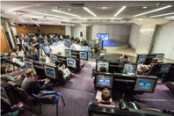
The results of the International Antarctic Expedition were resumed in the Presidential Library
Joint scientific researches of the Antarctic territory play an important role in the development of the Polar region. This was announced at the conference entitled “Science Without Boundary: Swiss Polar Research and Antarctic Circumnavigation Expedition,” which took place in the Presidential Library. It summed up the results of the international Antarctic Circumnavigation Expedition (ACE), which was working around Antarctica from December 20, 2016, to March 20, 2017.
Opening the conference, the Consul General of Switzerland in St. Petersburg Michel Fayette pointed out that the ACE expedition was the first project of the Swiss Polar Institute, the Swiss Federal Institute for Forest, Snow and Landscape Research (Forschungsanstalt für Wald, Schnee und Landschaft - WSL), the Federal Institute of Technology in Zurich (Eidgenössische Technische Hochschule Zürich - ETHZ), the University of Berne and Paulsen Publishing House. He emphasized: “The expedition became a milestone in the Antarctic research. Owing to it, the international scientific community received new information about the continent, and, what is especially important, the project brought together young scientists from different countries in their interest in the study of remote territories.”
The Antarctic expedition was held under the auspices of the Russian Geographical Society, which provided the research vessel “Akademik Treshnikov” for research work. “I really liked the idea of the ACE Maritime University, because international teams could use the scientific laboratories equipped on board and thereby gain an valuable experience of marine research in a number of directions, from biology to climatology and oceanography,” - Swiss Ambassador to Russia Yves Rossier said.
“It's too early yet for reviewing the results of the expedition. We need about 3-4 years to investigate all the received material,” - Frederik Paulsen, expedition member, Honorary Consul General of Russia in Lausanne and a member of the Board of Trustees of the Russian Geographical Society mentioned. “Nevertheless, there are some results. We learned, for instance, that the sea pollution does not depend on the remoteness of the inhabited areas: in all oceans, you can find pieces of plastic, even if very small; and that a population of walruses is growing, as well as blue whales’, previously considered an endangered species,” - the polar researcher added.
The Presidential Library pays close attention to the issues of studying and developing the polar territories. Annually, in the end of February “The Arctic Day” forum is taking place in the Senate Square, bringing up the issues related to an exploration of the Arctic territory, a study and a preservation of its natural heritage, an innovative development of Arctic technologies, etc. In April 2017, at the International Arctic Forum in Arkhangelsk the Presidential Library presented its electronic collection entitled The Arctic - a territory of a dialogue. It included both official documents relating to this region, as well as digital copies of rare books that tell about the history of Arctic exploration.
The history of the research of the South Pole is presented on the Presidential Library website in particular editions. So, the book of 1912 A study of polar countries: a history of travels to the North and South Poles from ancient times to the present, included in the electronic collection focused on Development of the Arctic, tells that people were led to study Antarctica by the misperception of the size of this territory: “There was a conviction that the land of the northern hemisphere should correspond approximately to the same continental space in the southern hemisphere in order to keep the globe in balance and make impossible its overturn. These idle speculations of scientific fantasy caused a series of travels to discover the unknown southern land.”

